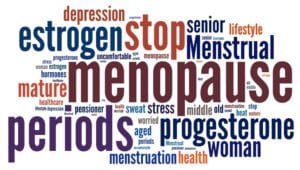Written by Joyce Smith, BS. This study showed that inhalation of neroli oil by postmenopausal women improved their quality of life related to menopausal symptoms, increased sexual desire, and reduced blood pressure.
 Menopause, a natural aging process involving a decrease in female sex hormones, carries with it symptoms of hot flashes and palpitations 1; psychological symptoms such as depression, anxiety, restlessness, and sleep disorders; decreased sexual desire, and an increased risk of cardiovascular diseases 2. Previous studies have shown that neroli essential oil (Citrus aurantium L. var. amara) has antidepressive and antianxiety effects 3, prompting researchers to investigate the effects of neroli oil aromatherapy on menopausal symptoms, stress, and estrogen in postmenopausal women. In this double-blind, controlled trial, sixty-three healthy postmenopausal Korean women were randomized into three groups to inhale either 0.1% or 0.5% neroli oil dissolved in almond oil or almond oil (control) for 5 minutes twice daily for 5 consecutive days. Menopause-related symptoms, as determined by the Menopause-Specific Quality of Life Questionnaire (MENQOL) 4; sexual desire visual analog scale (VAS); serum cortisol and estrogen concentrations, blood pressure, pulse, and stress VAS, were measured before and after inhalation.
Menopause, a natural aging process involving a decrease in female sex hormones, carries with it symptoms of hot flashes and palpitations 1; psychological symptoms such as depression, anxiety, restlessness, and sleep disorders; decreased sexual desire, and an increased risk of cardiovascular diseases 2. Previous studies have shown that neroli essential oil (Citrus aurantium L. var. amara) has antidepressive and antianxiety effects 3, prompting researchers to investigate the effects of neroli oil aromatherapy on menopausal symptoms, stress, and estrogen in postmenopausal women. In this double-blind, controlled trial, sixty-three healthy postmenopausal Korean women were randomized into three groups to inhale either 0.1% or 0.5% neroli oil dissolved in almond oil or almond oil (control) for 5 minutes twice daily for 5 consecutive days. Menopause-related symptoms, as determined by the Menopause-Specific Quality of Life Questionnaire (MENQOL) 4; sexual desire visual analog scale (VAS); serum cortisol and estrogen concentrations, blood pressure, pulse, and stress VAS, were measured before and after inhalation.
After aromatherapy treatment, the following effects of neroli essential oil were found:
Effect of Neroli Oil on Menopausal Symptoms, Sexual Desire and Stress:
- After 5 days of intervention, the total MENQOL score significantly decreased from baseline in the 0.1% and 0.5% neroli oil groups (P<0.001) and (P=0.03) respectively but did not decrease significantly in the control group.
- Sexual desire VAS score significantly increased in the 0.1% neroli group (P=0.049) and 0.5% group (P=0.001) and significantly decreased in the control group (P=0.013) after treatment
Effect of Neroli Oil on Blood Pressure and Pulse Rate:
- Systolic blood pressure was significantly lower in the group inhaling 0.5% neroli oil than in the control group. (P=0.03)
- Diastolic blood pressure decreased in both the 0.1% and 0.5% neroli groups and increased in the control group with significant mean changes among the groups. (P=0.001)
- Pulse rate increased in the control and the 0.1% groups and decreased in 0.5% neroli oil group but the differences were not significant
Effect of Neroli Oil on Serum Cortisol and Estrogen Levels:
- Serum cortisol levels decreased (but not significantly) in all three groups. Also, there were no differences in serum estrogen levels within or among the three groups.
This study showed that inhalation of neroli oil by postmenopausal women improved their quality of life related to menopausal symptoms, increased sexual desire, and reduced blood pressure. In addition, inhalation of neroli oil may reduce stress levels and stimulate the endocrine system. These findings indicate that neroli oil can be used to relieve various symptoms related to menopause.
Source: Choi, Seo Yeon, Purum Kang, Hui Su Lee, and Geun Hee Seol. “Effects of inhalation of essential oil of Citrus aurantium L. var. amara on menopausal symptoms, stress, and estrogen in postmenopausal women: a randomized controlled trial.” Evidence-Based Complementary and Alternative Medicine 2014 (2014).
Copyright © 2014 Seo Yeon Choi et al. This is an open access article distributed under the Creative Commons Attribution License, which permits unrestricted use, distribution, and reproduction in any medium, provided the original work is properly cited.
Click here to read the full text study.
Posted November 9, 2017.
Joyce Smith, BS, is a degreed laboratory technologist. She received her bachelor of arts with a major in Chemistry and a minor in Biology from the University of Saskatchewan and her internship through the University of Saskatchewan College of Medicine and the Royal University Hospital in Saskatoon, Saskatchewan. She currently resides in Bloomingdale, IL.
References:
- Fantasia HC, Sutherland MA. Hormone therapy for the management of menopause symptoms. Journal of Obstetric, Gynecologic, & Neonatal Nursing. 2014;43(2):226-235.
- Avis NE, Colvin A, Bromberger JT, et al. Change in health-related quality of life over the menopausal transition in a multiethnic cohort of middle-aged women: Study of Women’s Health Across the Nation (SWAN). Menopause (New York, NY). 2009;16(5):860.
- Lopes Campêlo L, Gonçalves e Sá C, de Almeida A, et al. Sedative, anxiolytic and antidepressant activities of Citrus limon (Burn) essential oil in mice. Die Pharmazie-An International Journal of Pharmaceutical Sciences. 2011;66(8):623-627.
- Lee O, Kim J, Lee H, Choue R. Nutritional status, quality of diet and quality of life in postmenopausal women with mild climacteric symptoms based on food group intake patterns. Korean Journal of Community Nutrition. 2012;17(1):69-80.
